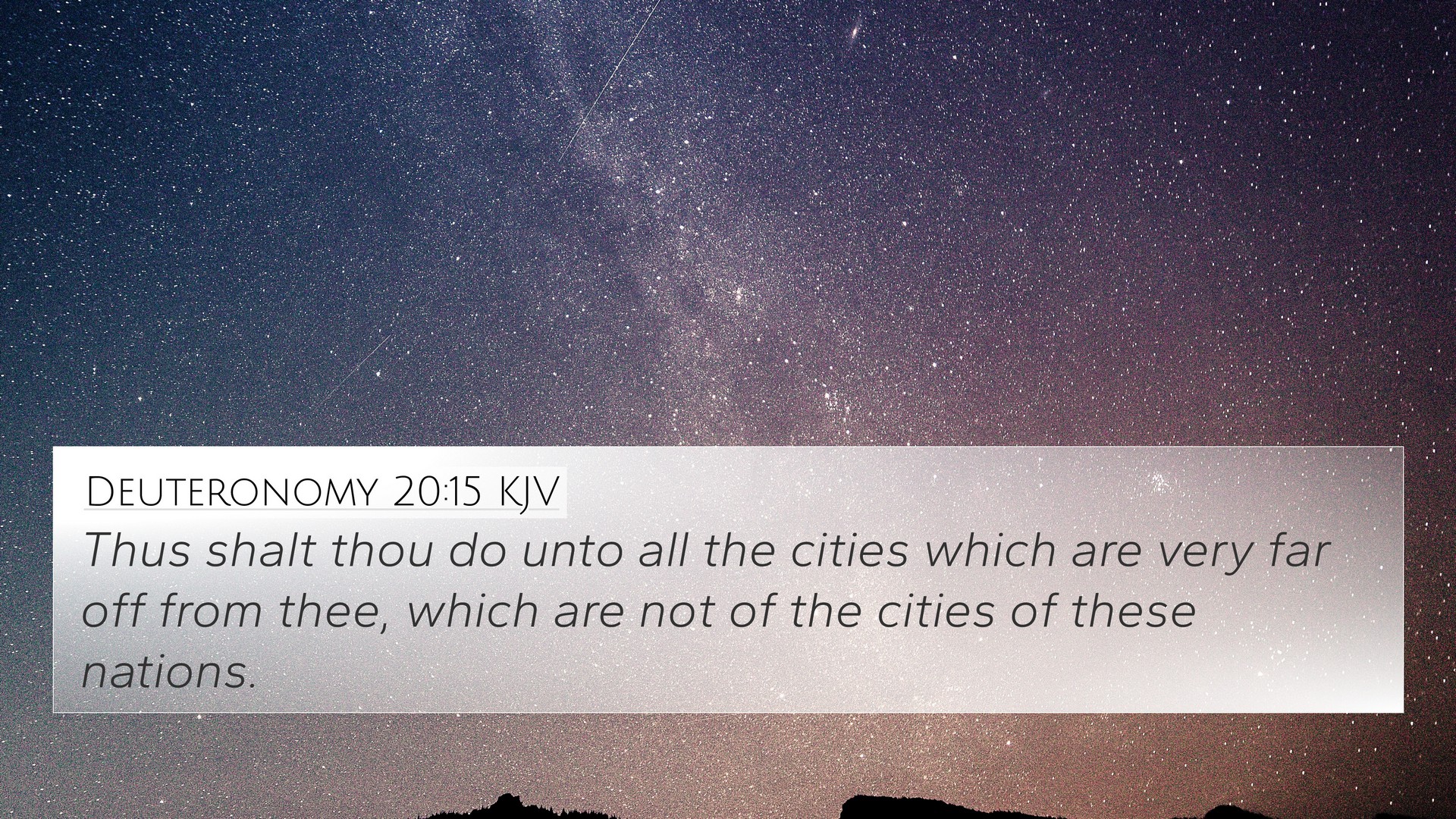Understanding Deuteronomy 20:15
Deuteronomy 20:15: "Thus shalt thou do unto all the cities which are very far off from thee, which are not of the cities of these nations."
Summary of Meaning
The context of Deuteronomy 20:15 involves instructions given by Moses to the Israelites regarding warfare. In this passage, Moses outlines the conduct expected when engaging with enemy cities that are distant from the Israelites' own territory. The emphasis is on the difference in treatment between nearer and farther cities, hinting at the moral and strategic considerations that God imparts to His people.
Insights from Commentaries
Matthew Henry: Henry emphasizes the idea that God’s people must act with integrity and discernment, particularly when dealing with distant nations. He explains that the instructions serve as a reminder of God’s sovereignty, asserting that even in warfare, divine principles must guide Israel’s actions.
Albert Barnes: Barnes provides additional commentary on the separateness of Israel’s approach to distant cities compared to those that were part of Canaanite territory. His analysis suggests that these instructions denote both a moral obligation and a reflection of God’s plan to preserve His covenant people without unnecessary bloodshed or destruction.
Adam Clarke: Clarke adds that this verse illustrates a broader principle of mercy and moderation. Distant cities are not to be treated with the same hostility as those within the land. This indicates God’s desire for justice and the upholding of human dignity, even amidst conflict.
Connections to Other Bible Verses
This verse can be tied to various other scripture texts, showcasing a thematic link or contrast. Below are several Bible verses that relate to Deuteronomy 20:15:
- Deuteronomy 20:10-14: These verses explain instructions for besieging cities, highlighting the distinctions made based on the proximity of the enemies.
- Joshua 11:19-20: Discusses the unyielding nature of the Canaanites, establishing the consequences of their moral corruption.
- 2 Samuel 8:2: David's military conquests exemplify the treatment of nations, which parallels the instructions given to the Israelites.
- 1 Kings 20:20: This verse details a specific battle against the distant enemy of Aram, illustrating the practical application of warfare principles.
- Romans 12:18: Paul’s exhortation to live peaceably with all points to the broader ethical standards that can be related back to the teachings in Deuteronomy.
- Matthew 5:7: "Blessed are the merciful," reflecting God's call to emphasize mercy in all dealings, including warfare.
- Proverbs 24:17-18: Warns against rejoicing over the downfall of enemies, which complements the temperance found in the commandments of warfare.
Thematic Connections
The verse presents broader themes such as:
- Moral Conduct in War: Highlights the importance of ethics influenced by divine guidance.
- God's Sovereignty: Affirms that God oversees all actions, including those of war.
- Justice and Mercy: Exhibits a clear division between justice meted out to Canaanites and the extended mercy towards distant nations.
Applications for Today
The moral teachings of this passage still resonate today, prompting readers to consider how they approach conflict with others. In a world rife with discord, Deuteronomy 20:15 serves as a reminder of the need for discernment, justice, and mercy in our engagements with others, whether near or far.
Tools for Bible Cross-Referencing
To dive deeper into cross-referencing biblical texts, the following resources can be very helpful:
- Bible concordance to locate scriptures thematically.
- Bible cross-reference guide to find relational scriptures.
- Cross-reference Bible study methods for deeper analysis.
Conclusion
Deuteronomy 20:15 provides a framework for understanding the interplay between divine instruction and human action in warfare. Through the lens of various commentaries and scriptural connections, it becomes evident that the principles of mercy and justice continue to be significant in a modern context. Engaging with these themes through cross-referencing allows for richer insight into scripture and its application in our lives today.


